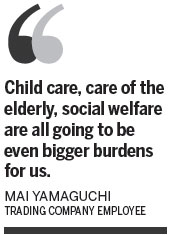Japan's young fret as recession hits the country again
When Japanese Prime Minister Shinzo Abe responded to Japan's surprise recession by delaying a sales tax increase, it was a cause for worry, not celebration, for many young Japanese.
This generation, barely aware of their country's economic heyday, frets that putting off tough decisions now could make the future even worse.
Despite Abe's unprecedented stimulus efforts - almost everything short of dropping money from helicopters - Japan has slipped into recession again, less than two years after the last one. With the country's debt rising, its population aging and job security fading, young people in particular wonder when, or if, Japan will bounce back.
"This is our children's future," said Mai Yamaguchi, a 29-year-old trading company employee heading into the gaudy Shibuya shopping area for an outing with her 4-month-old son and two other young moms with babies. "Child care, care of the elderly, social welfare are all going to be even bigger burdens for us."
Under pressure to reduce the developed world's heaviest per capita debt burden, totaling more than a quadrillion yen ($8.5 trillion), Abe raised the sales tax from 5 percent to 8 percent in April, and was supposed to increase it to 10 percent next year. But after the economy, already fragile after two decades of malaise, shrank for two quarters in a row, he put off the second increase until 2017.

Yamaguchi was unimpressed by that decision.
"I'm grateful to Mr Abe for his policies to improve child care, but putting off the tax increase, well, they say the pension system is on the verge of bankruptcy. I think it would have been better to go ahead and raise the tax as planned," she said.
The generation born as Japan's economic bubble burst in the early 1990s will be supporting a vast cohort of retirees. Though the nation is rich, with ultramodern public transport, low crime and excellent public health services, most people are making do without the security of the lifetime employment enjoyed by their parents and grandparents.
Meanwhile, Japan's economy is being eclipsed by neighboring China, whose up-and-coming high-tech and industrial companies are increasingly potent rivals.
Rapid aging
A low birth rate and increased life expectancy mean that Japan's working age population is declining while the number of retirees and centenarians is rising. The rapid aging of Japanese society is so evident in the mix of pedestrians on the street, in the media and in political discourse that the issue is on many minds.
Ryosuke Sunaga, a college senior decked out in his best job-hunting suit and brand-new briefcase, said that by the time he has children, he expects the sales tax will be at least 15 percent.
On Friday, Abe dissolved the country's parliament for a Dec 14 snap election to seek public approval of the tax hike delay and to affirm public support for his all-or-nothing policies to revive Japan's economy.
He has pledged to vanquish long stagnation by injecting tens of trillions of yen into the economy, pushing prices higher and the value of Japan's currency lower. He also has promised a sweeping and drastic overhaul to help improve the country's crumbling competitiveness.
So far, that combination, dubbed "Abenomics," has yielded mixed results.
Profits of big exporters have surged, but higher costs have hit households and smaller companies.
(China Daily 11/26/2014 page11)








